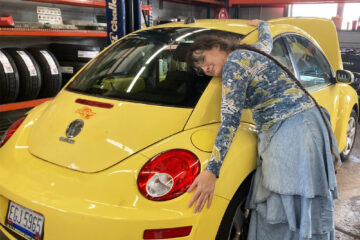As writers, we get to set everything up so that nothing is our hero’s fault; the villains are just BAD for no reason, and that can feel pleasurable.
But, it’s a dangerous thing to do. Here’s why.
Real evil comes from people like… me.
Yes, me. Let me explain.
Who is a villain?
Real evil is banal, it thinks it’s doing right, that it is the hero of the story and you, perhaps, are the cardboard villain.
It’s a cliché that everyone is the hero in their own story because it is, for the most part, true. For most of us, our worst actions come from a place of trying to do good.
Anti-integration racists were “protecting the children”, remember.
A pause, as I think through all the evils ascribed to “protecting the children.” Is the root of all evil fear for the children? From homophobia to the holocaust, a lot of evils have been laid at the feet of protecting innocents. When Bush Junior invaded Iraq, I remember a conversation I had with a friend, who I thought was open-minded and liberal. I don’t remember what I said, something about how it made no sense and would destabilize the region… and this very nice woman who never failed to bring a covered dish to the pot luck or cookies to the bake sale said, “I don’t care if every last child in Iraq dies if it makes my child a fraction safer. You’d understand if you were a mother.”
What a horrifying, villainous sentiment. I have a child now. I still don’t understand it. If my child were killed, I wouldn’t want random people who happened to live near the killers to die for it, much less people who happened to live a country or two away from them. I also doubt destabilizing any place in the world makes any child safer, rather it does the opposite, but that’s another blog post.
This blog post is about why you need to show sympathy for the villain in your works. Show them being kind to dogs. They always replace the toilet paper roll when it’s low. They remember their mail carrier’s birthday. That’s the kind of person who perpetrates evil.
Because the truth is, barring edge cases, we’re all the kind of person who could perpetuate evil. Is there a case, a scenario, you can think of, where you would harm another person? Really think about it. I know I’ve heard friends say casually, “I’d kill a person if they messed with my family.” Would you? To protect a loved one? An ideal? A dog?
(My dog is gently snoring behind me. She’s going to creep into the text.) I would definitely crotch-punch anyone who hurt my dog, and I think we can agree that said crotch-punching would neither be productive nor nice, as it won’t help my dog be unhurt nor help the dog-hurter mend their ways. Trust me on that one, there’s a heap of research into how, in fact, humans do not stop doing things if they are physically punished for them, rather they engage in new bad behaviors because of the trauma of physical punishment and keep doing the thing punished for.
Don’t believe me? Grrl, I got so many reputable, peer-reviewed hits on a simple google search:
no study has found physical punishment to have a long-term positive effect, and most studies have found negative effects.
– Joan Durrant, PhD and Ron Ensom, MSW RSW – “Physical Punishment and Children: Lessons from 20 Years of Research” printed in National Institute of Health
Increased Adult Aggression and Antisocial Behavior. Given the strong link found between corporal punishment and aggression and antisocial behavior in childhood, it is not surprising that this association would continue into adulthood.
“More Harm than Good” – another summary of corporal punishment research
Research on crime deterrence shows that increasing punishment severity does little to prevent crime.
Is Increasing criminal penalties effective at reducing crime? Nevada Independent.
TL;DR: Violent criminals don’t think about consequences when they commit crimes – they’re acting out of irrational emotion. Non-violent criminals don’t think about consequences because they tend not to know what they are. Both are more likely to have suffered corporal punishment as children, pointing to the possibility that violence via punishment begets more violence.
When I crotch-punch that person who hurt my dog? I am a villain. Perfectly representative of typical villainy.
So why is it dangerous to leave the good parts out of villains?
When you create a villain who is flat-out evil, you are aiding and abetting evil, because you are making it easier for people to not see themselves in the villainy.
That anti-integration person? They always say that they “haven’t a racist bone in their body.” They know what a racist looks like … like a cardboard villain in a cartoon. They, personally, have never used the N-word or assisted in a lynching. How could they be racist? They aren’t EVIL like the cartoonish racist in that movie.
They know evil when they see it. It wears black uniforms with silver insignia and stops to kick a dog for no reason. They have no reason to look for evil in themselves, because they aren’t kicking dogs, they are a good person. They have no reason to look for evil in systems of oppression, because they know evil comes from BAD PEOPLE, not good people making bad decisions, or avoiding decisions, or just… not noticing that the thing that benefits them a little hurts someone else a lot.
That’s what we have to push back against – the idea that badness comes from identifiable bad people. Because we need to fight evil, and we won’t fight the real evil – the evil living in kind, banal, normal people around us – if we’re looking for Voldemort to show up.
Our bad guy finds the ‘bad person’ and punishes them, causing more bad behavior from that person and from others who witness the punishment. Because that’s how humans work.
But I want evil in my antagonist, not misunderstood banality!
Well, a lot of villains are misinformed, or their view of what is an evil to fight is… awful and wrong. Like that racist person “protecting the children” – they see black people just going about their lives as a problem. I once watched a video of white suburbanites in the 60s arguing against integration. “They should improve themselves instead of forcing their way in,” an upset woman said… she was assuming somehow that these new neighbors who had advanced degrees and had worked hard to afford the house had somehow not earned it and needed to ‘improve themselves’ in some vague way without moving to a nicer neighborhood. Like, the people moving into her neighborhood were literally a pair of college professors with five degrees between them, but the narrative she’d told herself about who a black couple are was stronger to her than reality. I find it hard to believe no one told her, “um, they have college degrees.” I find it easy to imagine her dismissing this as irrelevant, or assuming the college degree was somehow not as valuable as her own high school diploma.
Ask yourself, what is this villain not seeing? What is their blind spot? Their key ignorance? Their assumption? What do they see as an attack or crime that isn’t? Remember that, to privilege, equality feels like an attack because they are losing their dominance, their lion’s share, that felt normal and equal to them.
And then show their thought process, show your readers the reality of evil, because the only way we can truly fight evil in the world is to start by examining it in ourselves.
We’ll get farther rooting out the small, banal evils we are complicit in than pointing to someone else to change their ways, and though I’ve written some pretty villainous villains (Queen of Ratana, anyone?) it’s my hope to encourage my readers to join me in reducing the net evil in the world.
Next time someone hurts your dog, please do not crotch-punch them.
What evils are you perpetuating?


